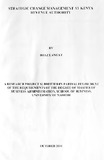| dc.description.abstract | This management research project was titled Strategic change management at KRA. Kenya Revenue Authority is a state corporation in the ministry of Finance mandated to collect and account for government revenue. KRA has undergone many strategic and operational changes in the recent past, all aimed at improving efficiency and effectiveness in discharging its mandate. The objective of this project was therefore to determine the strategic change management practices at KRA. The research design was a case study. In-depth study on the respondents was done. Respondents were interviewed and documented for analysis. The responses were analyzed using content analysis in a continuous prose.
The study found out that KRA is influenced by its operating environment to a great extend and hence the need to be responsive to these conditions. KRA has also been responsive to changes as evidenced by the various reform initiatives that have taken place in the recent past. These include setting up reforms office to co ordinate projects, engaging expatriates with experience and skills in project implementation, increasing capacity through training, both internal customers (staff) and external customers (taxpayers), upgrading the servers, change champions among others. This has resulted in increased revenues, increased taxpayer satisfaction and hence voluntary compliance, increased staff morale through empowerment with knowledge and skills, efficient processes as evidenced by shorter queues and increase in returns filed. It was also evident from the responses that management structure and style affect change management at change implementation due to levels of approvals. There are incidences of resistance to change, both from the staff, taxpayers and systems. This is due to various factors such as fear of the unknown, threat to power, limited capacity among others. This resistance to change is managed by involvement, training, workshops and improving capacity.
The study concludes that KRA has successfully managed strategic change, it has therefore managed to cope with the changing environment. The revenue collected has been on the increase, customer satisfaction has improved, and on line filing uptake has been satisfactory. Staff has also generally been motivated, there is more participation and innovation, change is readily accepted and staff is more informed. KRA has become a respected company in the public sector and is benchmarked with other advanced revenue authorities regionally and globally. Other phases of projects are still being implemented. | en_US |



